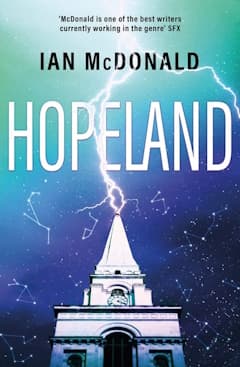
Hopeland by Ian McDonald
(Gollancz, 2023)
Reviewed by Nick Hubble
Hopeland is a huge novel in every respect, coming in at nearly 650 pages, spanning locations including the UK, Greenland and the Pacific Islands, and encompassing a time period running from the 2011 London riots to a climate-ravaged early 2030s. However, its full temporal scope is even bigger than this summary suggests, stretching back into the eighteenth and nineteenth centuries and forward to a future, millennia hence, as it poses the question of whether a family might outlive the Anthropocene by lasting for 10,000 years.
Not a normal family of course, or even your standard extraordinary one, although Hopeland does contain one of the latter in the form of the Brightbournes. In a poignant estrangement of the allure of patriarchy and primogeniture, McDonald depicts the effect of ‘the Grace’ on the Brightbournes, by which the first-born son of most generations is blessed with a charmed life. They are brilliant, mercurial romantic heroes but at a cost to the happiness and wellbeing of all those around them. Hence, these Brightbourne men are doomed to wander while leaving their ancestral seventeenth-century family home largely in the care of the women of the family. In contrast, the Hopelands, seen by some as a cult or a secret society, are—as we learn from a variety of found texts including a transcription of a literary salon in Fitzrovia and a Wikipedia page on ‘The Open Family Community’—the product of early twentieth-century utopian and social theories concerned with blending ideas of secular religion and open relationships with the concept of non-geographical nations.
The novel begins when Amon Brightbourne meets Raisa Peri Antares Hopeland in the streets of Soho and helps her win a race to become one of the Electromancers of London. Alongside Amon, we learn about Raisa and the lives of the Hopeland ‘kynnd’, who grow up as nongendered kids until they become a boy or a girl and move into the Girls’ or Boys’ House (a third option does subsequently come into being at the insistence of Raisa’s own child). Raisa became a girl but didn’t like being a girl and so quit the Girls’ House to spend two years living camped out in Epping Forest, before discovering an affinity with lightning. However, Raisa’s Electromancer career turns out to be short lived—towards the end of the novel, she comes to the realisation that her great gift is to start a thing and then know when to let it go and walk away—and, now aware of the double-sided nature of Amon’s ‘Grace’, she travels to Iceland with help from kynnd, where she sets out to find ways to help her family survive 10,000 years. In the meantime, Amon, now obsessed with the Hopelands, travels from ‘hearth’ to ‘hearth’ before eventually becoming entwined in the fate of the tiny island nation of Ava’u, who are destined to become the protagonists of the World’s ‘first great climate migration’.
This gloriously leftfield blend makes Hopeland sound like a novel of ideas, which on one level it very much is, but it is also a testament to how writing itself can be liberated by abandoning binary modes of thought. Indeed, I’d forgotten how good McDonald is at drawing you in, nudging you along unexpected byways in the plot, making you care about minor characters, and consistently confounding expectations when you think you know what is coming next. In other words, he makes you want it: that full out-of-body experience of just giving in to the readerly pleasure of being swept away by a novel. Dangerous things in that respect, novels, with their capacity to make you wonder what if … you could set out and build a network of humans of all races and genders and neurologies and histories and ages into ‘a nation within all nations, a religion with no belief, a family with no marriage, no mother- or fatherhood, no siblings. Only and always, kynnd’.
Review from BSFA Review 21 - Download your copy here.
